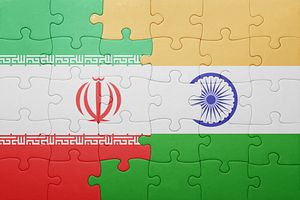The removal of sanctions on Iran has opened up new vistas for foreign investors. With the recent back-to-back visits to Iran by India’s Minister of State for Petroleum and Natural Gas Dharmendra Pradhan on April 9 and 10 and External Affairs Minister Sushma Swaraj on April 16 on 17, India has sent a clear message: It wants to strengthen economic ties with Tehran and take advantage of the changing geo-political situation. Yet India has always enjoyed a strong relationship with Iran, even during the sanctions era.
First, both India and Iran have consistently sought to maintain independent foreign policies, without becoming the appendages of any other state. And so after U.S. sanctions were imposed in 2012, then Indian Prime Minister Dr. Manmohan Singh made it a point to attend the NAM Summit in Tehran, much to the chagrin of the West.
Moreover, the economic relationship between India and Iran has been reasonably stable, even under sanctions. This relationship is likely to be bolstered by the recent visits of Pradhan and Swaraj, which were not only designed to enhance energy cooperation and accelerate the development of Chabahar Port, but also to conclude pending agreements on preferential trade, taxation and bilateral investment, all essential for stronger economic cooperation.
During Swaraj’s visit, Iranian President Hassan Rouhani gave assurances that Iran would provide the vital support India’s oil and gas needs, besides expanding overall bilateral ties. According to Vikas Swarup, spokesman for India’s Ministry of External Affairs, Rouhani spoke about Chabahar, as a “defining partnership which has the potential of connecting the entire region.”
Earlier, during Pradhan’s trip, India signed agreements on crude oil imports and Iran’s Farzad-B gas field development. It also announced an investment of $20 billion in Chabahar Port, in addition to a $100 million line of credit.
These relatively robust ties notwithstanding, the bilateral relationship is often overshadowed by the Saudi Arabia and Pakistan factors. This is despite the fact that both India and Iran have sought to handle contentious issues in a measured way. In the wake of Indian Prime Minister Narendra Modi’s trip to Saudi Arabia, there were question marks over how India would walk the tightrope between the Arabs and the Persians. However, the recent visits by the two ministers as well as the likely visit by Modi himself to Iran underscore the fact that India will balance both relationships and no longer views them through the narrow “Shia-Sunni” prism. Interestingly, even Pakistan – traditionally a close ally of Saudi Arabia – is seeking to build closer relations with Iran as well.
If one were to look at the Pakistan factor in India-Iran relations, during Rouhani’s trip to Pakistan, the issue of the involvement of India’s intelligence agency, the Research and Analysis Wing (RAW) in Pakistan got considerable attention. Asked by a Pakistani journalist whether the Pakistan Army Chief Raheel Sharif had raised this issue with him, Rouhani was quick and unequivocal in stating that Iran has an important relationship with Pakistan and an equally important one with India. Pakistan had released the video showing the confession by Kulbhushan Yadav, who it alleged was a RAW spy. Indian intelligence agencies insist that the video is inauthentic and that Yadav was kidnapped from Iran by a Sunni terrorist organization.
For India then, Iran remains a trusted partner. For now, New Delhi would do well to wrap up the pending agreements and deals with Iran. Longer term, India should look beyond hydrocarbons and aspire to give particular emphasis to developing a robust economic and strategic relationship with Iran, as this could ultimately provide more stability in the Gulf region.
Manish Vaid is a Junior Fellow with the Observer Research Foundation, having research interest in energy policies and geopolitics. Tridivesh Singh Maini is a New Delhi-based policy Analyst associated with The Jindal School of International Affairs, Sonipat, India. Views are personal.
































